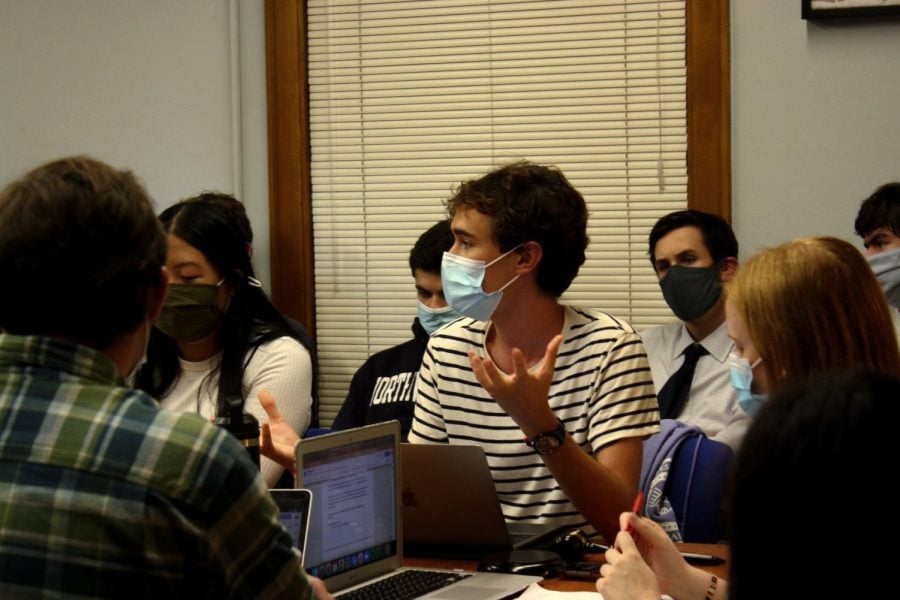Northwestern Political Union votes that American patriotism is not good
Daily file photo by Rebecca Shaid
Medill junior Spencer Allan speaks at a previous Political Union debate. Attendees voted against American patriotism at Monday’s debate.
January 25, 2022
Attendees at Northwestern Political Union’s Monday debate voted against the integrity of American patriotism.
Led by Weinberg freshman Jamie Gall, the prevailing side won 18 to nine with four abstaining. Gall’s argument addressed moments in which American patriotism induced acts of terror, including the Jan. 6 insurrection encouraged by former President Donald Trump’s speech to his supporters.
Other attendees said patriotism has the potential to undermine democracy. Medill junior Felix Beilin said politicians often use patriotism to back policy decisions without allowing citizens to think about them on a deeper level.
“(Patriotism) is an extremely powerful political motivation and political heuristic,” Beilin said. “It’s a political sentiment, not a process. Because it’s so strong and versatile … it’s dangerous.”
Leading the argument in favor of American patriotism, Weinberg freshman Parker Stava focused on the definition of patriotism as love for and devotion to one’s country. Stava said if the majority of a country’s citizens are unpatriotic, the nation will either die out or become authoritarian in nature.
Stava used Nazi Germany as an example of an unpatriotic nation. He said although Nazis did not realize their country’s ideology was wrong, their horrific actions proved otherwise.
“A patriot (means) realizing what one’s country is doing is not in good intention,” Stava said. “Our country has flourished because people from all over the world … love in a place where we can be proud to live in.”
While many applied patriotism to a national scale, Weinberg junior Rebecca Huang said patriotism does not always apply to countries.
Instead, she said individual communities themselves contribute more to humanity than the patriotic notions of government.
“There are communities and towns in America that have been ignored and overlooked by the government, and with that comes a lot of mutual-aid communities trying to help each other,” Huang said.
While some believed community and patriotism are separate, others saw patriotism as a sentiment rooted in American history that needs to be upheld.
Weinberg junior Will Secker said thinking about patriotism on an international scale is not helpful because America’s rules and regulations only apply to itself.
“We have to think in terms of our country because these are our laws,” Secker said. “These are our people and devoting (ourselves) to loving our people and loving our country is good because it motivates us.”
Despite Secker’s sentiment, other attendees disagreed with this America-centric approach to policy. Medill junior Spencer Allan, a former Daily staffer, tied American patriotism into exceptionalism and said the pair have blinded citizens to America’s problems domestically.
In her closing statement, Gall said patriotism is not solely defined by goodness. Using former San Francisco 49ers quarterback Colin Kaepernick’s acts of defiance at the start of several NFL games, Gall said Trump’s dissent deemed Kaeperneck’s actions unpatriotic despite his attempt at creating social change in the United States.
Gall added that for real change to be made, patriotism cannot be upheld.
“(Patriotism) is a bad thing for America because it can lead to things like the Jan. 6 riot,” Gall said. “Loving one’s neighbor and patriotism are not the same thing.”
Email: [email protected]
Twitter: @swarthout_iris
Related Stories:
— Northwestern Political Union votes in favor of canceling student loan debt
— Political Union majority votes industrialization has been good for humanity
— Should journalists remain strictly objective? Political Union majority votes yes


